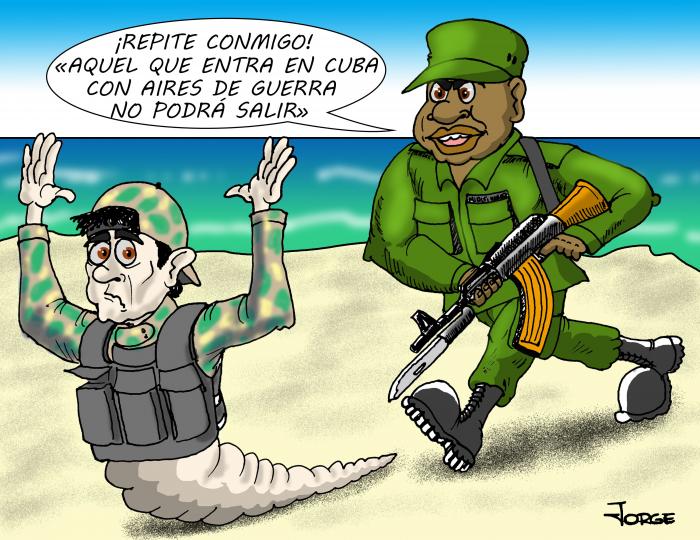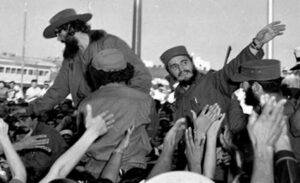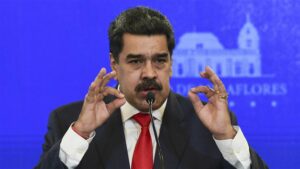The Ministry of the Interior reported the details of a recruitment plan aimed, from US territory, at promoting terrorist actions in the Greater Antilles.
The Ministry of the Interior (Minint) of Cuba informed the details of a recruitment plan, neutralised in December 2023, directed, from US territory, to promote terrorist actions in the Greater of the Antilles.
The investigations led to the arrest of the main perpetrator, Ardenys García Álvarez, a 40-year-old Cuban citizen, who emigrated to the United States illegally in 2014, after receiving sanctions for crimes of robbery and speculation, said the second head of the Specialised Body of the Criminal Investigation Directorate of the Ministry of the Interior, Colonel Víctor Álvarez Valle.
The officer added that García Álvarez returned to the island in November of last year, in a penetration by sea in the area of the Manuel Channel, in the province of Matanzas, with a Jet Ski type nautical motorbike, registered in the US state of Florida, in perfect conditions to navigate. During the occupation of the vehicle, several rounds of ammunition were found in a knob.
In addition, the accused entered the vehicle with five pistols of various origins and characteristics, accompanied by several cartridges. He was carrying American Tactical and two different models of Smith & Wesson, manufactured in the United States, along with a Steyr, from Austria, and a Taurus, created in Brazil.
In the statements given by the accused, between the time of his capture and May 2024, as part of a criminal trial with the precautionary measure of provisional detention, he confessed to establishing contact, through social networks, with Willy González, representative of the group calling itself La Nueva Nación Cubana en Armas (The New Cuban Nation in Arms).
He then established communication with the recruiter Dayán Quiñones, and they exchanged messages via the Telegram platform. Subsequently, he participated with the terrorist group in two military trainings organised at shooting ranges.
García Álvarez mentioned a communiqué read in a hotel the night before the second training. The document emphasised the determination to use armed struggle, «putting the lives of a group of determined men at risk, in order to save the lives of many others».
However, the real objectives behind this declaration of intent were laid bare in Willy González’s multiple calls for the «awakening of the people», by means of violence against offices, sugar cane fields, the tobacco factories of Pinar del Río… «We are now going to the level of bodily harm», he assured.
Another member of La Nueva Nación Cubana en Armas, referred to by the accused under the nickname «El Lobo», is Jorge Luis Fernández Figueras, promoter and financer of aggressive actions directed against children’s circles, schools, polyclinics and the warehouses of the Organización Básica Eléctrica, especially in the municipality of San Miguel del Padrón, in the province of Havana.
The main accused recruited some people, who have already been arrested, including his father Rigoberto García Ávila, who stated that he knew the purpose of assaulting a military unit and taking its weapons, as well as the need for a farm to gather all those mobilised, and a truck to transport the human forces and weapons.
García Ávila was part of the plan, as one more element, sentenced the chief prosecutor of the Directorate for the Confrontation of Corruption and Illegalities of the Attorney General’s Office, Edward Roberts Campbell.
Another implicated party, Pavel Fernández Alfonso, said that García Álvarez told him about the intention to recruit people all over the country, prepare them in a farm that he would buy and decide from there what acts they would carry out.
The Prosecutor illustrated the crimes foreseen in the Criminal Code, which were committed by the main executor. The first of these, implemented in Article 282.1, provides, for those who enter the country without the legal formalities or migratory provisions, a penalty of one to three years’ imprisonment or fines of three hundred to one thousand quotas, or both.
Article 142.1, dedicated to other acts against the security of the State, reserves a sentence of ten to 30 years’ imprisonment, life imprisonment or the death penalty for those who violate territorial space on board a ship or aircraft, enter the nation clandestinely or organise or form part of armed groups to participate in the commission of offences covered by the Criminal Code.
For its part, Article 142.2 provides for a prison sentence of one to two decades for those who offer shelter, provide aid, supply provisions to the elements or groups described, or in any other way favour their operations.
The offences against constitutional order, criminalised in Article 119(2), include promoters of armed uprisings, irrespective of whether they actually come to fruition or are unsuccessful attempts. In the latter case, they deserve a sentence of four to ten years’ imprisonment.
Article 151(1) deals with acts committed with explosive or lethal weapons or devices, chemical or biological agents or other means or substances.
Those who manufacture, provide, sell, transport, ship, bring into the Island or carry weapons, ammunition or flammable, asphyxiating, toxic, explosive, chemical or biological agents, incur a penalty ranging from ten to 30 years imprisonment, life imprisonment or death.
Finally, espionage, according to Article 116.3, establishes imprisonment of seven to 15 years for those who, without due authorisation, carry out reconnaissance, take photographs, seek or obtain reports, or draw up or possess plans, sketches of military camps, sites, zones or units, warships or aircraft, railways, or any document or information concerning the security of the state.
Dangerousness not only responds to the criterion of the quantity of weapons in the possession of an individual or a group, but also to subjective elements consisting of what actions they intend to carry out with those weapons, Roberts Campbell said.
Cuba, he recalled, issues the National List of persons and entities linked to terrorism. Its most recent update was published in the Official Gazette No. 83 Extraordinary of 7 December 2023.
Those included in the list have been subject to criminal investigations and are being sought by the Cuban authorities for being linked to the promotion, planning, organisation, financing, support or commission of acts of terrorism in the national territory or in other countries.
There are cases on the List relating to terrorist acts committed in the 1990s in hotels and tourist resorts in Havana against Guillermo Novo Sampoll, Pedro Ramón Crispín Rodríguez and José Francisco Hernández Calvo.
Some of these cases relate to the infiltration of terrorists from the United States along the Cuban coast to carry out terrorist acts in the province of Villa Clara, as well as to various plans to carry out attacks against the then President Fidel Castro Ruz in countries such as Mexico, Spain, Honduras, Colombia, the Dominican Republic and Panama.
Another case involves incitement to carry out actions that affect Cuba’s social order and the normal functioning of socio-economic entities, as well as the promotion of armed aggression against the territory. Among those implicated are Alexander Otaola Casal, Orlando Gutiérrez Boronat and Eliecer Ávila Cecilia.
These efforts by Cuba comply with UN Security Council Resolution 1373, adopted in 2001, the Prosecutor added. The binding document urges states to investigate, prosecute and punish those involved in such events, and also calls for international cooperation to address these dangers.
For his part, Colonel Alvarez Valle reiterated the willingness to cooperate with the competent agencies in the United States to report all actions committed by terrorists residing in the northern nation. «We hope that at some point there will be reciprocity in the exchanges we have had at these levels with the American side.
«Our country has maintained a transparent, serious, cooperative and responsible policy in the fight against terrorism, and we will maintain the willingness, together with the people, the Armed Forces and the Ministry of the Interior, to discover, confront and neutralise this type of activity,» he concluded.




